
Vaccines
Scope & Guideline
Catalyzing collaboration in the field of vaccine research.
Introduction
Aims and Scopes
- Vaccine Development and Technology:
This area encompasses research on the design, formulation, and innovative delivery methods of vaccines, including mRNA, viral vector, and protein-based vaccines, aimed at enhancing immunogenicity and efficacy. - Immunology and Vaccine Response:
The journal publishes studies that investigate the immune responses elicited by vaccines, including humoral and cellular immunity, as well as the factors influencing these responses in diverse populations. - Epidemiology and Public Health Impact:
Research focusing on the epidemiological aspects of vaccine-preventable diseases, vaccine effectiveness, and the assessment of vaccination strategies in various demographic groups is a core focus. - Vaccine Hesitancy and Acceptance:
The journal addresses the psychological, social, and cultural factors contributing to vaccine hesitancy, aiming to identify strategies to improve vaccine uptake and public trust in vaccination programs. - Global Health and Policy:
'Vaccines' emphasizes the importance of vaccine accessibility, distribution, and policy implications, particularly in low- and middle-income countries, to achieve global health goals.
Trending and Emerging
- COVID-19 Vaccination Studies:
Research related to various aspects of COVID-19 vaccinations, including efficacy, safety, public acceptance, and the impact of vaccination on disease severity, has surged, reflecting the ongoing global response to the pandemic. - Innovations in Vaccine Technology:
There is a growing emphasis on novel vaccine platforms such as mRNA and nanoparticle-based vaccines, showcasing advancements in vaccine technology aimed at improving immunogenicity and stability. - Vaccine Hesitancy Research:
Studies exploring the sociocultural factors influencing vaccine hesitancy and acceptance are becoming increasingly prominent, as understanding and addressing these issues is critical for improving vaccination rates. - Global Health Equity in Vaccination:
An emerging trend is the focus on ensuring equitable access to vaccines across different populations, particularly in low- and middle-income countries, highlighting the importance of global health initiatives. - Combination Vaccination Strategies:
Research on the effectiveness of co-administering multiple vaccines (e.g., COVID-19 and influenza vaccines) is gaining attention, particularly in the context of public health strategies to maximize vaccination coverage.
Declining or Waning
- Traditional Vaccine Platforms:
As newer technologies like mRNA and viral vectors gain dominance, research on traditional vaccine platforms (e.g., inactivated and live-attenuated vaccines) appears to be less prevalent, indicating a shift towards exploring more innovative approaches. - Vaccine-Preventable Diseases with Established Vaccines:
Research focused on diseases that are already well-controlled through existing vaccines, such as measles and polio, has decreased as global health efforts pivot to address emerging threats like COVID-19. - Longitudinal Studies on Established Vaccines:
There is a noticeable reduction in longitudinal studies examining the long-term efficacy and safety of established vaccines, as the urgency of newer vaccine research takes precedence.
Similar Journals
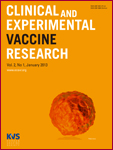
Clinical and Experimental Vaccine Research
Empowering research to combat infectious diseases.Clinical and Experimental Vaccine Research, an esteemed journal published by the Korean Vaccine Society, serves as a vital platform for disseminating groundbreaking research in the fields of Immunology, Infectious Diseases, and Public Health. Since its inception in 2012, this open-access journal has been committed to advancing knowledge and fostering collaboration among professionals dedicated to vaccine development and evaluation. With an impactful presence and a Q3 ranking in several categories on the Scopus index, it reflects a robust commitment to quality, evidenced by its placement within the 41st to 59th percentiles across multiple disciplines related to medicine and health. Situated in Seoul, South Korea, at the Department of Pediatrics, Yonsei University Severance Children's Hospital, the journal not only provides a crucial resource for researchers and practitioners but also enhances the global discourse on vaccination strategies and public health interventions. By contributing to the ongoing dialogue in vaccine research, this journal plays an essential role in shaping future health policies and practices.
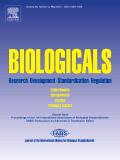
BIOLOGICALS
Fostering critical advancements in biological sciences.BIOLOGICALS, published by Academic Press Ltd - Elsevier Science Ltd, is a prestigious journal dedicated to advancing the fields of applied microbiology, biotechnology, immunology, and pharmacology. With an ISSN of 1045-1056 and E-ISSN of 1095-8320, this journal has established itself as a vital resource for researchers and practitioners, offering rigorous peer-reviewed content that spans converging disciplines from 1990 to 2024. With a commendable presence in the field, it ranks in the Q3 category across multiple domains, including applied microbiology and biotechnology, highlighting its contribution to critical advancements and knowledge dissemination. The journal's rankings reflect its relevance, with notable placements in Scopus Ranks, ensuring it remains an important platform for innovative research and discussion. Although it does not currently offer Open Access, the journal’s comprehensive review process guarantees the quality of published work, making it essential reading for professionals, academics, and students seeking to stay informed about the latest developments in biology and life sciences.

Med
Pioneering Interdisciplinary Insights in Medicine.Med, an esteemed journal published by CELL PRESS, stands at the forefront of interdisciplinary medical research, making significant contributions to the field of Medicine since its inception in 2020. With an impressive Q1 ranking in the Medicine (miscellaneous) category and a notable 96th percentile ranking in General Medicine according to Scopus, this journal is dedicated to disseminating high-quality research that advances medical knowledge and practice. Med provides a platform where researchers, professionals, and students can share their findings and insights, fostering a collaborative environment that bridges various aspects of medicine. While offering a comprehensive body of research, Med is committed to promoting open communication within the scientific community, ensuring that valuable information is accessible to those who seek to enhance their understanding and application of medical science. With a strong presence in the United States and a global readership, Med is poised to influence the future of healthcare significantly.
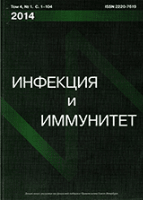
Infektsiya i Immunitet
Advancing knowledge in immunology and infectious diseases.Infektsiya i Immunitet, published by the esteemed SANKT-PETERSBURG-NIIEM IMENI PASTERA, is a prominent open access journal that has been disseminating vital research findings since 2011. Focusing on the fields of immunology and infectious diseases, this journal serves as a critical platform for scholars, professionals, and students in the Russian Federation and beyond. With an ISSN of 2220-7619 and an E-ISSN of 2313-7398, it currently holds a Q4 ranking in 2023 for both Immunology and Infectious Diseases, along with notable quartile standings in related fields. Despite its emerging status, Infektsiya i Immunitet provides valuable insights and contributes to the growing discourse on immunity and infection prevention strategies, making it an essential resource for those invested in advancing knowledge and enhancing public health outcomes. Researchers can conveniently access its wealth of articles and studies that bridge theoretical understanding and practical implications in their respective domains.

npj Vaccines
Empowering Global Immunization Insightsnpj Vaccines, published by NATURE PORTFOLIO, is an esteemed Open Access journal that has been at the forefront of vaccination research since its inception in 2016. With an impressive impact factor and ranking in the top quartile (Q1) across several categories including Immunology, Infectious Diseases, and Pharmacology, this journal provides a crucial platform for the dissemination of high-quality research and innovative findings in the field of vaccine development. Based in the United Kingdom, and with its broad scope encompassing both fundamental and translational studies, npj Vaccines facilitates significant discourse among researchers, professionals, and students dedicated to immunization strategies and public health. The journal's commitment to Open Access ensures that vital knowledge is shared widely, promoting collaboration and advancement in vaccine science on a global scale. Scholars are encouraged to contribute to this essential field, as their findings may significantly impact the future of disease prevention and control.

Emerging Microbes & Infections
Unlocking insights into emerging infections.Emerging Microbes & Infections is a premier open access journal, published by Taylor & Francis Ltd since 2012, dedicated to advancing the understanding of microbial infections and their implications in human health. With an impressive Q1 ranking across multiple categories—including Drug Discovery, Epidemiology, Immunology, and Infectious Diseases—this journal is at the forefront of research in the microbiological sciences. Covering a diverse range of topics, it serves as a vital resource for researchers, healthcare professionals, and students alike. The journal's commitment to open access ensures worldwide dissemination of cutting-edge findings, fostering collaboration and innovation in tackling challenges posed by emerging infections. As part of the thriving academic community in the United Kingdom, Emerging Microbes & Infections plays a crucial role in shaping the future of infectious disease research and public health.
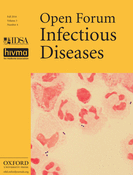
Open Forum Infectious Diseases
Leading the charge in open-access infectious disease research.Open Forum Infectious Diseases (ISSN: 2328-8957; E-ISSN: 2328-8957) is a leading open-access journal published by Oxford University Press, dedicated to advancing the field of infectious diseases. Since its inception in 2014, the journal has provided a platform for researchers to disseminate impactful findings in a rapidly evolving domain, achieving a remarkable Q1 ranking in both the Infectious Diseases and Oncology categories as of 2023. The journal encourages rigorous and innovative research, contributing significantly to global health discussions and informing best practices in clinical settings. As an open-access journal, it ensures that its content is accessible to a wide audience, fostering collaboration and knowledge sharing among researchers, professionals, and students alike. Positioned in the heart of the United States, Open Forum Infectious Diseases serves as a critical resource for the academic community, and its continued commitment to quality and relevance secures its status as an essential publication in the field.
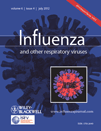
Influenza and Other Respiratory Viruses
Advancing knowledge in respiratory viral research.Influenza and Other Respiratory Viruses, published by WILEY, serves as a prominent peer-reviewed platform for the dissemination of research contributing to the understanding and management of respiratory viral infections. With an impressive impact factor and established as an Open Access journal since 2014, it ensures maximum visibility and accessibility of pivotal research findings in the realm of Epidemiology, Infectious Diseases, Public Health, and Pulmonary and Respiratory Medicine. Registered under the ISSN 1750-2640 and E-ISSN 1750-2659, the journal boasts Q1 rankings in four critical categories as of 2023, underscoring its significance within the scientific community. Researchers, professionals, and students can benefit from the convergence of knowledge that this journal facilitates from 2007 to 2024, fostering advancements in understanding viral pathogens and innovative treatment strategies that are increasingly vital to public health efforts globally.
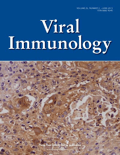
VIRAL IMMUNOLOGY
Unraveling the complexities of viral interactions with immune systems.Viral Immunology, published by Mary Ann Liebert, Inc, stands as a prominent journal dedicated to advancing the understanding of the interplay between viral infections and host immune responses. With a strong focus on immunology, molecular medicine, and virology, the journal provides a platform for the dissemination of high-quality research findings and innovative methodologies that could shape the future of these critical fields. Although it currently holds a Q3 rating across its relevant categories and a respectable ranking within the Scopus database, Viral Immunology continues to strive for excellence with a commitment to publishing influential research that informs both academic and clinical practices. The journal accepts submissions in various formats—original research, reviews, and commentaries—catering to a diverse readership that includes researchers, professionals, and students engaged in the biological and medical sciences. Readers can anticipate insightful articles that address urgent challenges in immunological responses to viral infections, paving the way for new therapeutic strategies and public health initiatives.
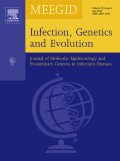
INFECTION GENETICS AND EVOLUTION
Bridging Molecular Genetics and Infectious Disease InsightsINFECTION GENETICS AND EVOLUTION is a premier scholarly journal published by Elsevier, focusing on the dynamic field of infection genetics and evolutionary biology. Since its inception in 2001, this journal has emerged as a critical platform for the dissemination of cutting-edge research, bridging the gap between molecular genetics, evolutionary theory, and infectious disease study. With an influence profound enough to secure its status in the Q1 category for Ecology, Evolution, Behavior and Systematics and impressive Q2 rankings in Genetics, Infectious Diseases, and Microbiology, the journal offers researchers unparalleled insights that advance the understanding of pathogen evolution and host interactions. Despite the lack of Open Access, the research published in this journal significantly contributes to the academic discourse and informs public health approaches. By publishing high-quality studies and reviews through 2024, INFECTION GENETICS AND EVOLUTION remains indispensable for academics, professionals, and students seeking to explore the intricate mechanisms of infection and adaptation in various organisms.